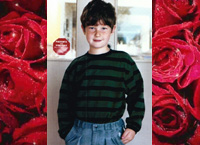

 Organ and Eye Donor Honored by Donate Life Float Committee |
|
|
A seven year-old boy from California, Nicholas Green, was killed by highway robbers in 1994 while vacationing in Italy with his family. His parents agreed to donate his organs and corneas, which went to seven Italians waiting for transplants. Reg and Maggie Green spoke openly to the media, with no bitterness, about their loss and decision. The world took the story--and the Greens--to its heart. Since then they have made a series of educational videos, given speeches and interviews around the world and cooperated in filming the Jamie Lee Curtis movie, “Nicholas' Gift.” In Italy donations are almost triple the rate they were in the year before Nicholas died. Nicholas' seven recipients are like many others who need a transplant - a mother who had never seen her baby's face clearly; a diabetic who had been repeatedly in comas; a boy of 15, wasting away with a heart disease, who was only the same size as a seven year old; a keen sportsman who could no longer see his children play games; and two children who had been hooked up to dialysis machines for years, four hours a day, three days a week. Then there was Maria Pia, a vivacious 19-year old girl who the night Nicholas was shot was dying too. Now, against all odds, she's healthy, is married and has two children, one of whom is called Nicholas. These seven people are not rich or famous and their lives are marked by the struggles we all have to face. But they feel they have been reborn. Few potential donors realize what a mighty gift they have in their hands. By one action they can save other families from the devastation they themselves face or alternately condemn them to a lifetime of sorrow. None of this takes away the pain. The sense that life is missing a vital ingredient is there all the time. But donating does put something on the other side of the balance. For the rest of their lives donor families can feel proud that their loved ones saved someone in desperate need when no one else in the world could. |
